The 3rd ESG Competitiveness Forum successfully held
2023-07-18未知责任编辑0
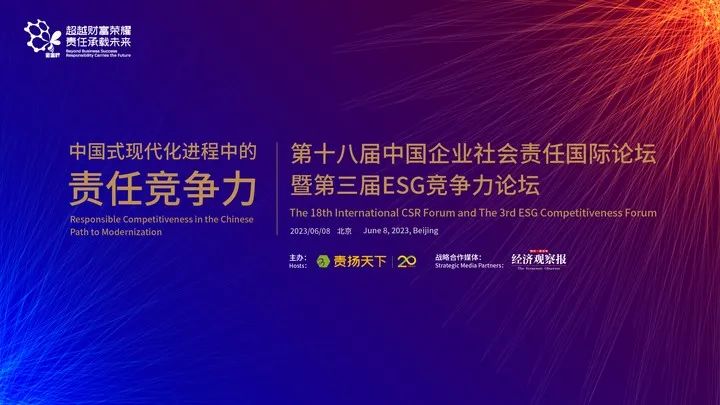
ESG is becoming a standard part of corporate strategy, which not only helps enterprises understand more deeply the risks and opportunities in social development and economic growth, but also has the potential to help them occupy a more advantageous ecological position in advanced business competition. ESG is strategically important for corporate competitiveness.
On June 8, 2023, the 3rd ESG Competitiveness Forum was hosted by GoldenBee Consulting as a part of the 18th International CSR Forum with the theme of "Responsible Competitiveness in the Chinese Path to Modernization". In the Forum, representatives from the Social Responsibility Department of the Bureau of Social Responsibility, the State-owned Assets Supervision and Administration Commission of the State Council (SASAC), and representatives from research institutions, industry associations and the corporate sector gathered to discuss the value and practical path of ESG, verified the organic link between ESG and business decisions, and provide inspirational paths and measures for enterprises to build ESG competitiveness.
The impact of global ESG trends on the development of ESG in China
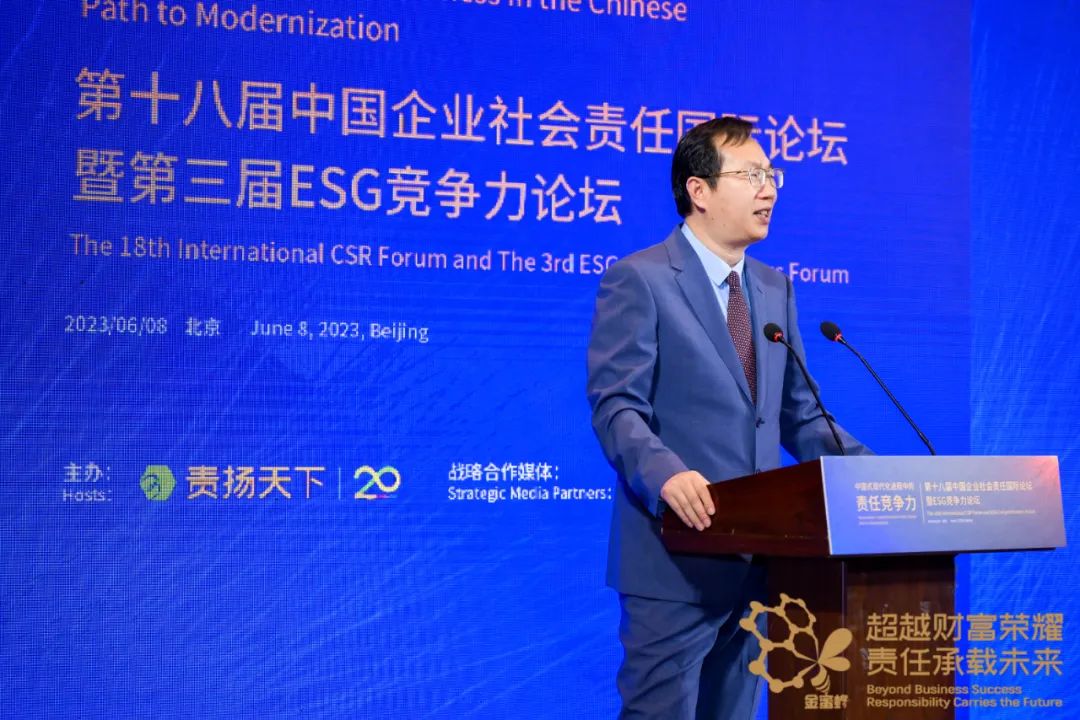
Zhang Zhengwei, Special Advisor to the Chair, International Sustainability Standards Board (ISSB)
The report to the 20th National Congress of the Communist Party of China (CPC) systematically elaborates on the five characteristics of Chinese path to modernization, namely, modernization with a huge population, of common prosperity for all, of material and cultural-ethical advancement, of harmony between humanity and nature and of peaceful development. This has put forward new requirements for enterprises to fulfill their social responsibilities.
In his speech, Mr. Zhang said that the five characteristics of Chinese path to modernization not only fully embody the requirements of ESG, but also go beyond this concept. He demonstrated that in the process of developing ESG, China should be eclectic and self-confident to fully communicate with global stakeholders and contribute Chinese wisdom and solutions to ESG global practices.
Zhang Zhengwei pointed out that in the development of global ESG disclosures, three significant features have emerged: disclosure regulations have changed from multiple standards to a unified benchmark; disclosure requirements have changed from optional to mandatory; and disclosure content has changed from loose to structural. Therefore, Chinese enterprises should pay attention to the relationship between pilot implementation and latecomers’ advantages in ESG regulations, the relationship between well-written reports and excellent management in supervision, and the relationship between copying and innovating disclosure practices. He summarized ESG governance into four aspects: "responsibility, competence, diligence and performance", and proposed a more intuitive methodology to help enterprises understand and practice ESG more easily.
Fulfillment of environmental responsibility:
core competitiveness of enterprises
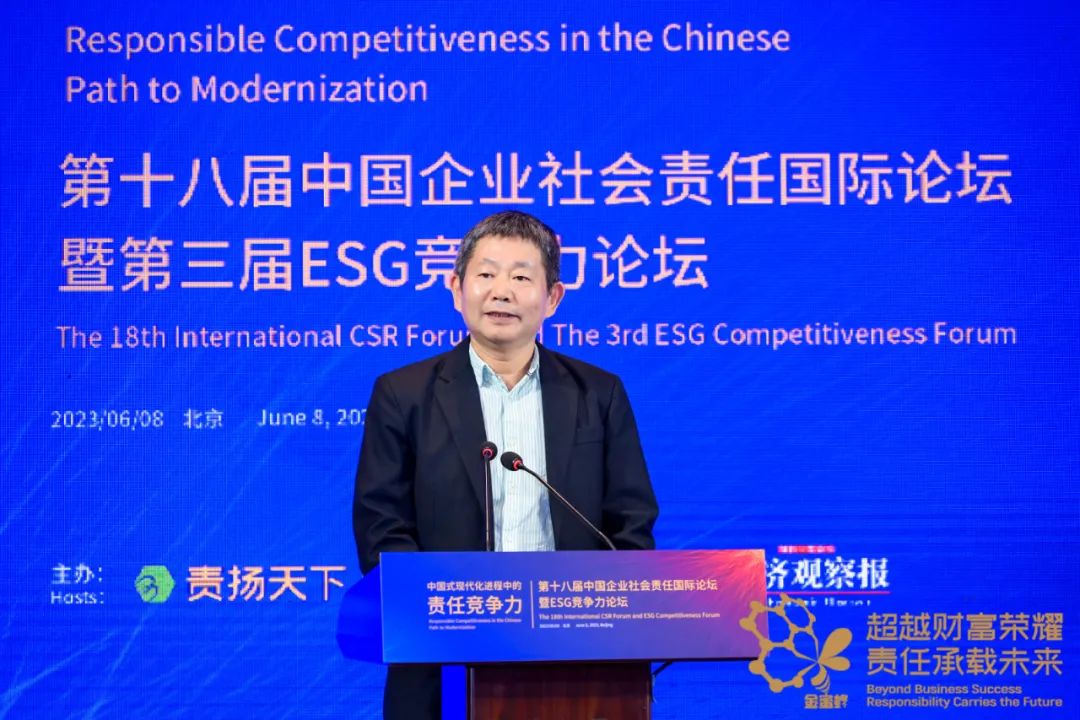
Ye Herui, President of ESG Branch, China Nuclear Safety and Environmental Culture Promotion Association (CNSCPA)
ESG Branch of CNSCPA aims to promote the effective integration of nuclear safety and environmental culture among government, enterprises and the public, and to promote the high-quality development of China's ecological and environmental quality. Mr. Ye addressed that any modern enterprise has multiple attributes that are of the present and the future, of the enterprise and the society, of China and of the international, of human beings and of the whole earth. In the context of the need to consider multiple enterprise attributes, a multi-dimensional approach to ESG consideration for enterprises has become an inevitable development trend.
Under the concept of "lucid waters and lush mountains are invaluable assets", the fulfillment of environmental responsibility is the competitiveness of enterprises, and also the way for modern Chinese enterprises to go international. As the ESG practice of domestic and foreign enterprises continues to deepen, and local governments and the public give increasing attention to the fulfillment of corporate environmental responsibility, enterprises should deeply realize that the outstanding performance of ESG competitiveness in China is environmental competitiveness, and take this as a grasp to improve the ESG competitiveness of enterprises, in order to maintain their competitive advantage in the fierce market competition.
ESG standards help improve competitiveness
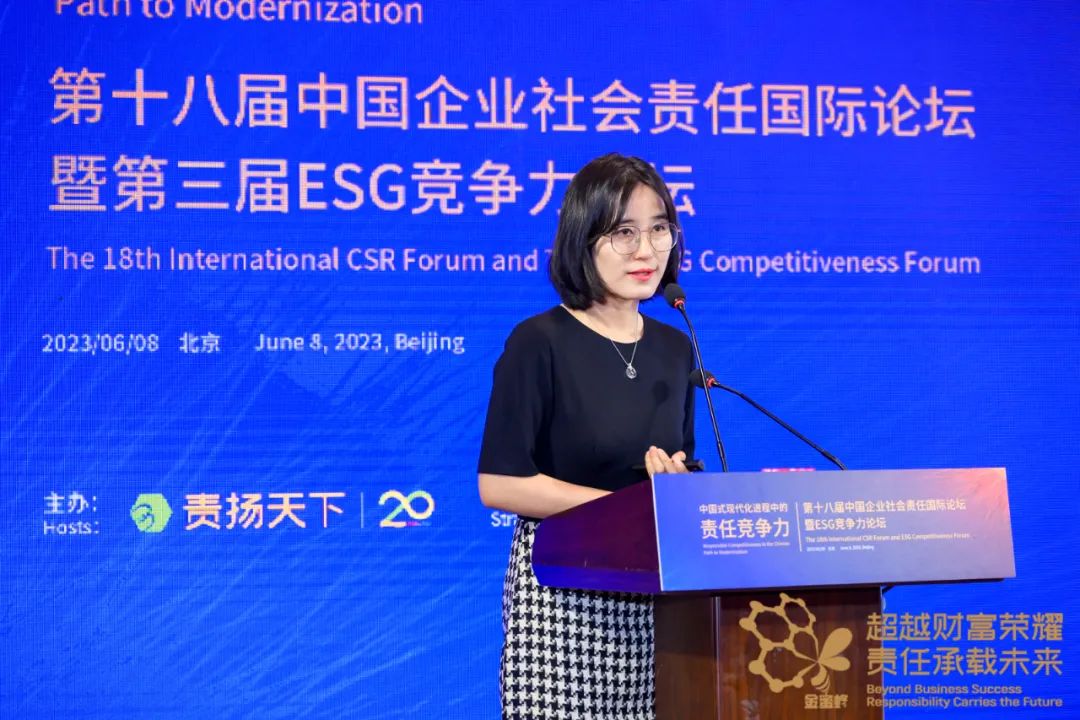
Ding Qing, Associate Researcher of the Resource and Environment Branch of the China National Institute of Standardization (CNIS)
Ms. Ding pointed out that ESG is not a new concept with zero foundation that came out of nowhere. From the perspective of standardization, ESG is standing on the shoulders of giants, bringing together achievements of many technical committees and technical standards.
For improving the ESG standard system, she put forward five suggestions, including: establishing a coordination and integration mechanism for ESG standards; strengthening the convergence of standards and policies; developing key technical standards for ESG that are urgently needed; actively stepping up cooperation with international platforms such as ISSB and International Organization for Standardization (ISO); and carrying out standardization pilot initiatives.
Increasing interest in corporate sustainability disclosures
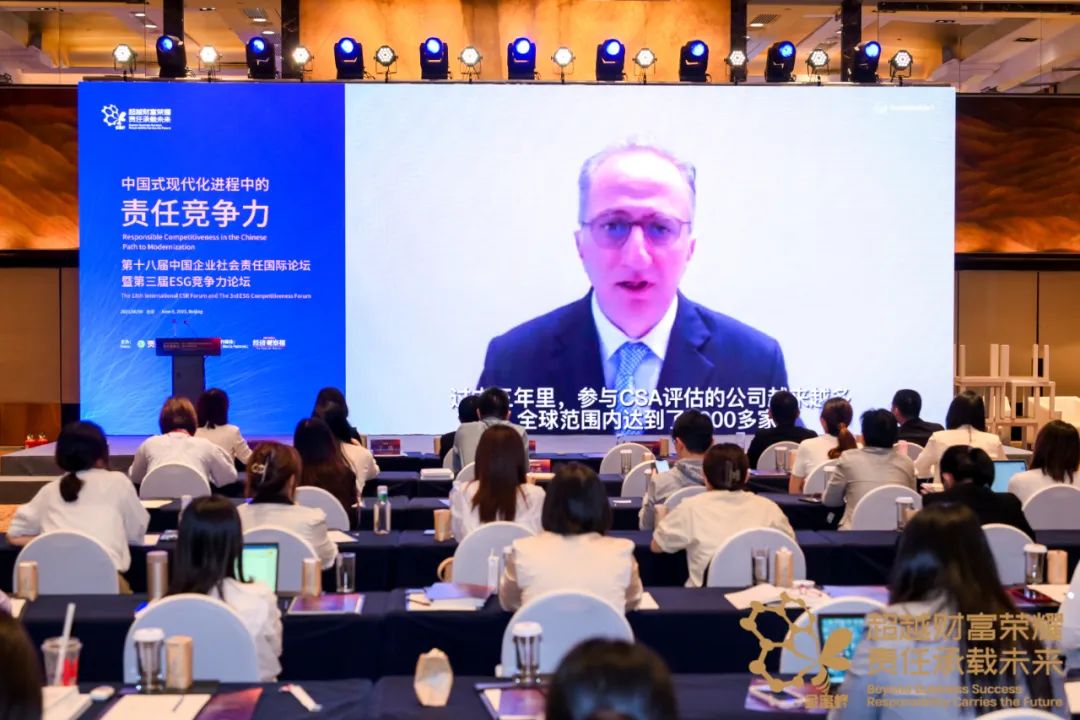
Edoardo Gai, Managing Director, Global Head of Sustainability Services, S&P Global Sustainable1
Edoardo Gai suggested that the interest of Chinese companies in sustainable business strategies has been growing in recent years. Over the past three years, an increasing number of companies has participated in Corporate Sustainability Assessment (CSA), reaching more than 3,000 globally. In China, more than 300 companies are actively participating in the 2022 CSA assessment, and the number will reach a new high this year.
ESG monetization accounting: The right way to deepen the development of valuation with Chinese characteristics
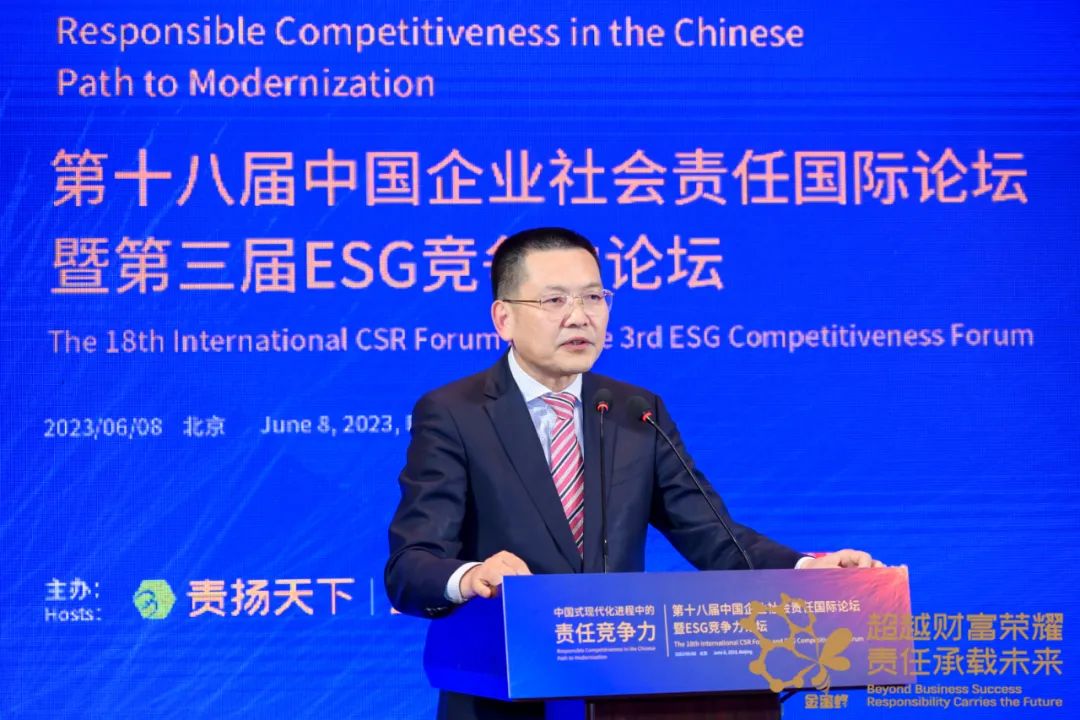
Yin Gefei, Chairman of the Board and CEO, Beijing Yibiao Digital Technology Co., Ltd.
ESG monetization accounting is one of the most concerned issues for financial institutions. When it revolves around the five characteristics of Chinese path to modernization, the inclusion of ESG values in line with these characteristics in the enterprise value evaluation system can form a valuation system with a comprehensive perspective of Chinese characteristics.
According to Mr. Yin, ESG monetization accounting can transform ESG non-financial risks and opportunities into concrete financial accounting; demonstrate the external value created by Chinese enterprises in the process of promoting the Chinese path to modernization through value monetization; provide investors with more realistic, intuitive and comprehensive corporate value reference; facilitate investors to select sustainable enterprises that meet the requirements of Chinese path to modernization; form a virtuous investment cycle, and continuously promote the development of ESG of Chinese enterprises.
ESG ratings and investment decision-making
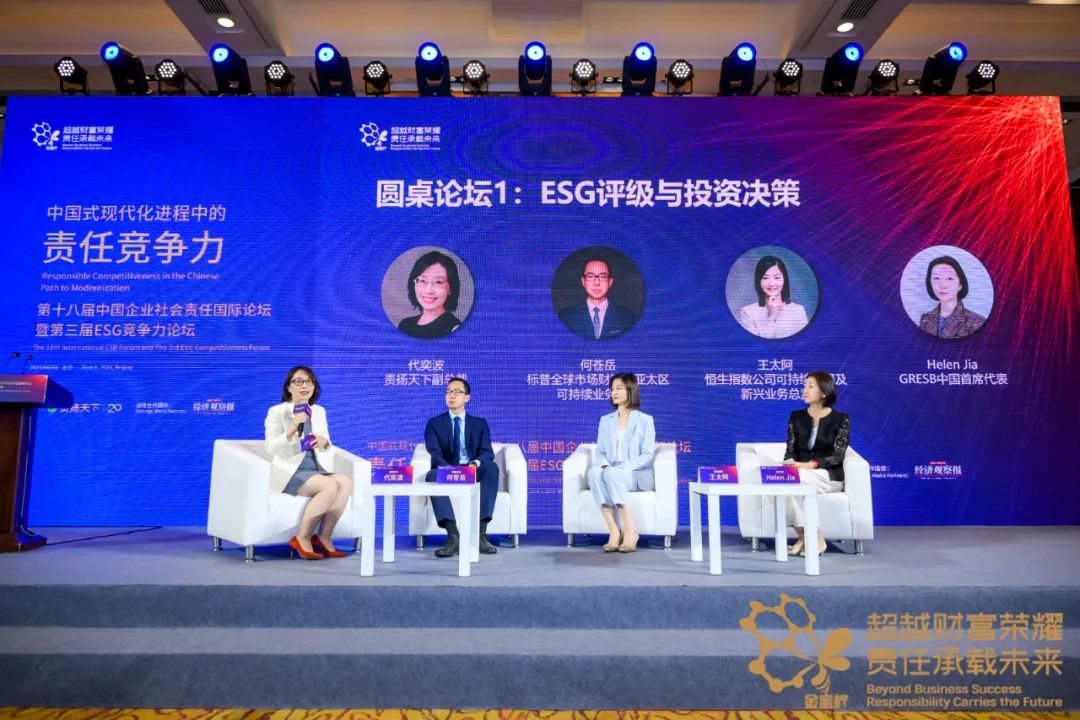
In Roundtable I, Dai Yibo, Vice President of GoldenBee Consulting, together with Robbie Ho, APAC Sales Director of ESG Advisory, S&P Global Market Intelligence; Wang Taie, Chief Sustainable and Emerging Business Officer, Hang Seng Indexes; and Helen Jia, Country Director in China, GRESB, discussed the theme of ESG rating and ESG decision making. Three aspects were highlighted: the international applicability of rating methods and their localization in China, the role of ESG in investment attraction, and the opportunities brought by ESG development for enterprises in China.
ESG strategic vision and action
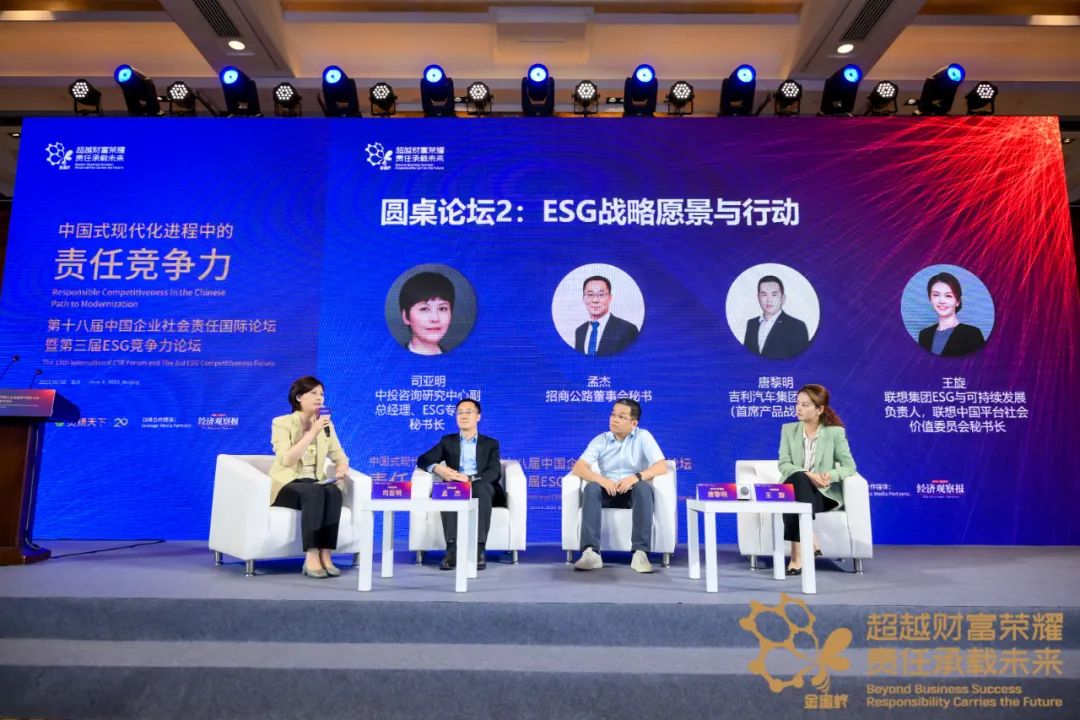
In Roundtable II, enterprise representatives from their respective ESG department were invited to shared insights on ESG strategic vision and action, including Si Yaming, Deputy General Manager of Research Center and Secretary General of ESG Special Committee, China National Investment Consulting Co., Ltd (CNICC); Meng Jie, Secretary of the Board, China Merchants Expressway Network & Technology Holdings Co., Ltd. (CMET); Tang Liming, CPO (Chief Product Strategy Officer), Geely Auto Group; and Wang Xuan, Responsible Person of ESG & Sustainable Development of Lenovo Group, Secretary General of ESG & Social Value Committee of Lenovo China Site. They shared three aspects of practice from the perspective of enterprises which are ESG strategy, ESG practice and ESG path, and introduced the practical experience of domestic representative ESG pioneer enterprises, which provided development ideas for more enterprises.
TCFD Preparedness
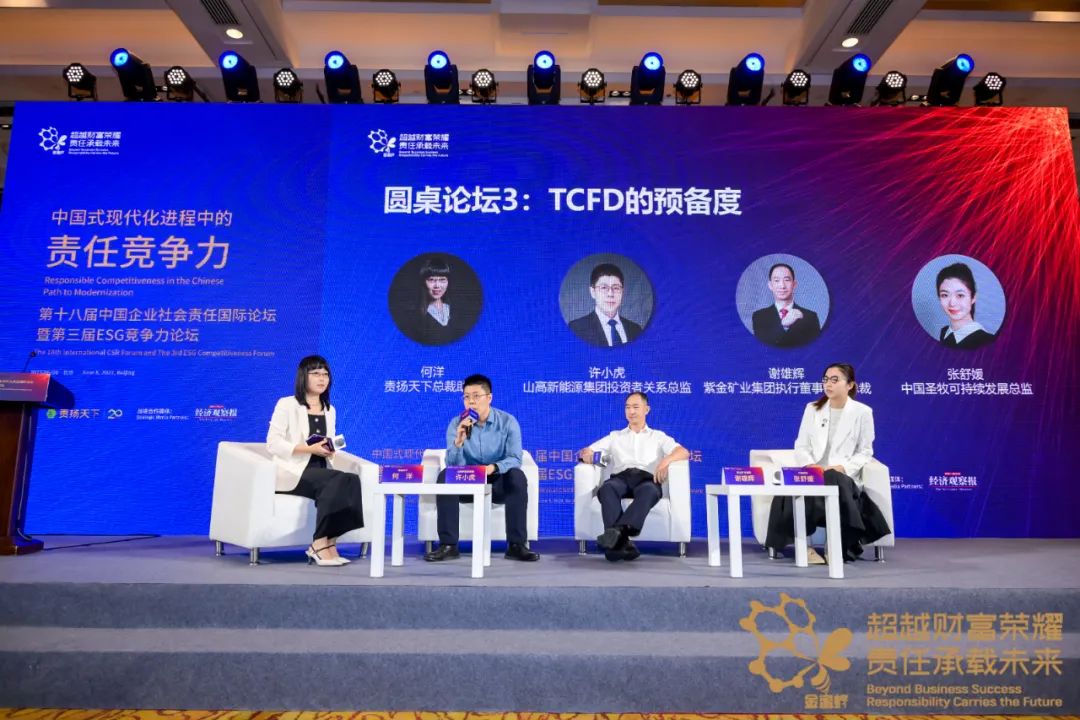
In Roundtable III, He Yang, Assistant President, GoldenBee Consulting, discussed with Xu Xiaohu, Director of Investor Relations, Shandong Hi-Speed New Energy Group Limited; Xie Xionghui, Executive Director and Vice President, Zijin Mining Group Co., Ltd.; and Zhang Shuyuan, Director of Sustainable Development of China Shengmu Organic Milk Limited, on how companies can cope with the risks and opportunities brought by climate change and how they can prepare to improve the level of TCFD-aligned disclosures.
About TCFD
The Task Force on Climate-Related Financial Disclosure (TCFD) was established by the Financial Stability Board (FSB) under G20’s jurisdiction in 2015 to develop a set of voluntary and consistent climate-related disclosure recommendations for use by companies in providing information to investors about their climate-related financial risks. Entities such as businesses, cities, and nonprofit organizations can use TCFD recommendations to measure climate risks and report it to their shareholders or stakeholders.
The guests shared the progress of climate management of their enterprises, and gave advice to the enterprises that are about to launch TCFD. Xu Xiaohu proposed to integrate relevant strategies into business and use ESG of TCFD as a means of risk control. Xie Xionghui pointed out that the China’s 30·60 Decarbonization action is both a challenge and an opportunity. Zhang Shuyuan believed that more proactive cross-sectoral cooperation is needed to improve the disclosure of climate-related information, and more transparent data management would help enhance the ability of companies to adapt and resist climate risks.
Best Practices
- The 100-year brand — Air Liquide also has a sense of juvenile
- Beijing Public Transportation Corporation: Developing green transportation to build a harmonious and livable capital
- CGN: Building a modern factory in barren deserts and developing a new win-win cooperation model along “Belt and Road”
Upcoming Event

All the materials on the site “Source: XXX (not from this site)” have been reprinted from other media. They do not imply the agreement by the site.
All the materials with “Source: CSR-China Website” are the copyright of CSR-China Website. None of them may be used in any form or by any means without permission from CSR-China Website.
GoldenBee Official WeChat
Copyright © Csr-china.net All Right Reserved.
京ICP备19010813号










